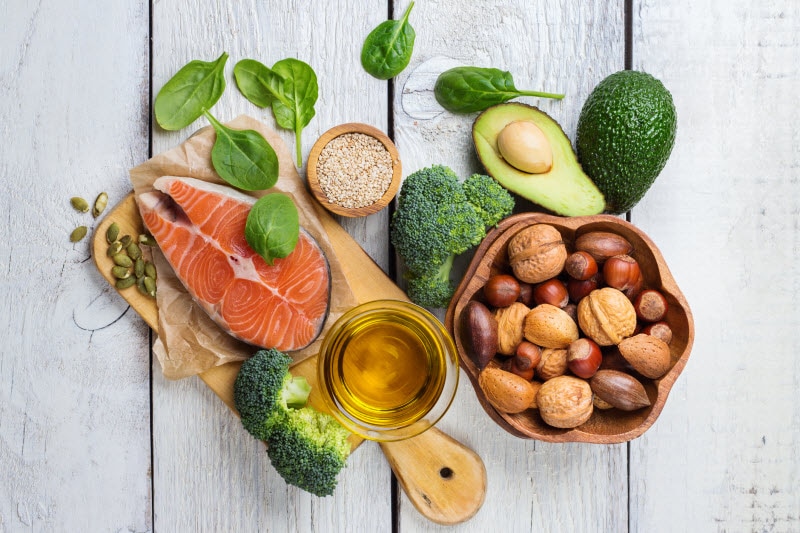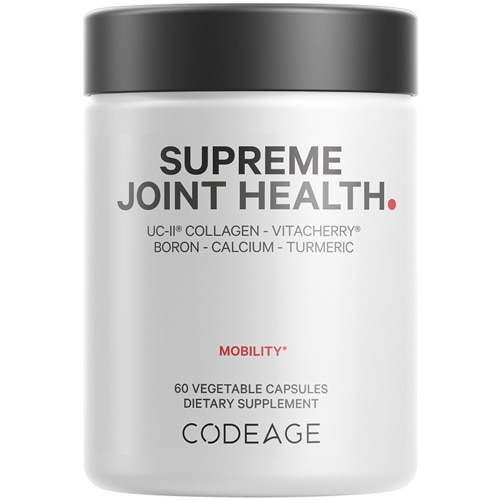[vc_row][vc_column][vc_column_text]The state of your
joints isn't something you likely considered until reaching a particular stage of life where they make themselves known—whether you're starting to feel stiff in the morning or your knees are groaning at you when you climb stairs or stand up from sitting.
While this may seem like an inevitable part of growing older, there are plenty of ways you can support your joint health to keep them strong and moving well as you age. Along with physical activity and rest, nutrition plays a vital role in maintaining joint health.

The Best Foods for Joint Health - by Joint Type
Joints are where two or more bones connect and allow for movement. There are different types of joints: freely movable (synovial), partially movable (cartilaginous) and immovable (fibrous). Each type has its own particular nutritional needs to stay healthy and strong.
Synovial joints
Synovial joints are the most common type of joints in the body and include the knees, elbows, shoulders and hips. These joints have a cavity filled with lubricating fluid where the bones contact each other. Each bone surface also has a thin layer of hyaline cartilage that coats the bones so they glide smoothly without causing damage. Synovial fluid also nourishes this cartilage and is packed with hyaluronic acid that traps moisture inside cells and reduces friction and pain.
Consuming foods that support joint health can increase the production of synovial fluid, which contain the cushioning nutrient, hyaluronic acid. This, in turn, promotes healthier joints and may contribute to reducing joint pain.
The best foods for joint health: Synovial joints
Cartilaginous joints
Cartilaginous joints, like those between the vertebrae in the spine, are connected entirely by cartilage, which
pads and protects the bones during movement. Over time,
cartilage can become brittle and stiff and break down with wear and tear and oxidative stress, one reason osteoporosis affects more people as they age.
Another factor is specific
changes to collagen proteins that cause the collagen to cross-link without enzymes. Too much collagen cross-linking also makes cartilage stiffer and more brittle, making it more likely to wear out. For this reason, foods with certain
enzymes that also support a healthy inflammatory response may reinforce collagen production and joint function.
Adding cartilage-building foods to your diet can support your joint health. These include foods with probiotics and antioxidants to help balance inflammation levels,
vitamin C-rich foods to support collagen production, along with
amino acid-containing foods that provide the building blocks for new tissues.
The best foods for joint health: Cartilaginous joints
Fibrous Joints
Fibrous joints are connected by fibrous tissue without a joint cavity and include the connective tissues that bind most bones of the skull, connect the long bones in the forearm and leg, and keep your teeth roots inside bony jaw sockets.
While there are no specific dietary recommendations for fibrous joints, a balanced diet rich in fresh fruits and vegetables, whole grains, healthy fats, low-fat dairy and lean protein, such as chicken or fish, is generally beneficial for overall joint health. Any of the foods listed above will support your fibrous joints and your overall health.
Creating a joint-friendly diet
A diet that focuses on reducing inflammation can help reduce joint pain, similar to the effects of non-steroidal anti-inflammatory medications (NSAIDs). Most simply, maintaining a balanced diet rich in fruits, vegetables, healthy fats and whole grains can help prevent joint problems such as gout or osteoarthritis while supporting overall health. Also, be sure to get adequate protein and
vitamin D.
Protein is essential for joint health because it helps build and repair muscle, bone, joints and surrounding tissues. Good sources include lean meats, seafood,
beans, legumes, soy products and nuts. Vitamin D helps your body absorb calcium from your diet, which is necessary for repairing and building bones.
In terms of what to avoid, limiting foods that can increase inflammation, such as sugars, refined grains and unhealthy fats, is best for your joints and general health. Following a whole foods
nutrition plan such as the
Mediterranean,
DASH, or
MIND diet that focuses on high fiber carbs, vitamins, minerals anti-inflammatory omega-3 fatty acids, and fruits and veggies is an easy way to ensure you hit your nutritional targets.
Here are some general
guidelines for getting enough anti-inflammatory foods.
- Include plenty of fruits and vegetables, aiming for at least five total servings daily. Some sources recommend 10 servings per day (5 each of fruit and vegetables).
- Try to eat at least two servings of fatty fish per week.
- Choose whole grains over simple carbohydrates for your daily meals.
If you find yourself falling short on your nutritional goals, consider a joint health supplement containing ingredients such as collagen, turmeric, hyaluronic acid, antioxidants and calcium to support your joint health.
†
Good options include
Codeage Supreme Joint Health UC-II® Type 2 Collagen Supplement with turmeric and bromelain enzyme and
Codeage Multi Collagen Peptides + Joint Health Blend Supplement with the antioxidant astaxanthin and turmeric.
Remember that, before starting any new supplement, it's a good idea to speak to your healthcare provider to discuss your goals and concerns.
†These statements have not been approved by the Food and Drug Administration. These products are not intended to diagnose, treat, cure or prevent disease.[/vc_column_text][/vc_column][/vc_row][vc_row][vc_column][vc_text_separator title="Featured Products" border_width="2"][vc_row_inner equal_height="yes" content_placement="middle" gap="35"][vc_column_inner width="1/3"][vc_single_image image="177031" img_size="full" alignment="center" onclick="custom_link" img_link_target="_blank" css=".vc_custom_1722792500927{padding-right: 7% !important;padding-left: 7% !important;}" link="https://www.vitacost.com/codeage-liposomal-turmeric-supplement-organic-full-spectrum-turmeric-fermented-botanicals"][/vc_column_inner][vc_column_inner width="1/3"][vc_single_image image="177030" img_size="full" alignment="center" onclick="custom_link" img_link_target="_blank" css=".vc_custom_1722792518856{padding-right: 7% !important;padding-left: 7% !important;}" link="https://www.vitacost.com/codeage-supreme-joint-health-uc-ii-type-2-collagen-supplement-turmeric-bromelain-boswellia"][/vc_column_inner][vc_column_inner width="1/3"][vc_single_image image="177037" img_size="full" alignment="center" onclick="custom_link" img_link_target="_blank" css=".vc_custom_1722792538060{padding-right: 7% !important;padding-left: 7% !important;}" link="https://www.vitacost.com/codeage-multi-collagen-peptides-joint-health-blend-supplement-astaxanthin-turmeric"][/vc_column_inner][/vc_row_inner][/vc_column][/vc_row]




